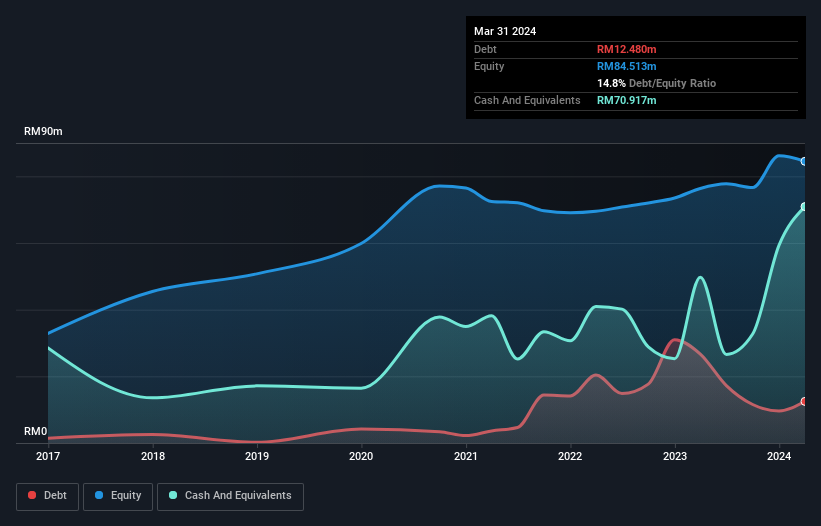- Malaysia
- /
- Electrical
- /
- KLSE:PWRWELL
These 4 Measures Indicate That Powerwell Holdings Berhad (KLSE:PWRWELL) Is Using Debt Safely

Legendary fund manager Li Lu (who Charlie Munger backed) once said, 'The biggest investment risk is not the volatility of prices, but whether you will suffer a permanent loss of capital.' When we think about how risky a company is, we always like to look at its use of debt, since debt overload can lead to ruin. As with many other companies Powerwell Holdings Berhad (KLSE:PWRWELL) makes use of debt. But the real question is whether this debt is making the company risky.
When Is Debt A Problem?
Debt is a tool to help businesses grow, but if a business is incapable of paying off its lenders, then it exists at their mercy. Ultimately, if the company can't fulfill its legal obligations to repay debt, shareholders could walk away with nothing. While that is not too common, we often do see indebted companies permanently diluting shareholders because lenders force them to raise capital at a distressed price. Of course, the upside of debt is that it often represents cheap capital, especially when it replaces dilution in a company with the ability to reinvest at high rates of return. When we think about a company's use of debt, we first look at cash and debt together.
See our latest analysis for Powerwell Holdings Berhad
What Is Powerwell Holdings Berhad's Net Debt?
As you can see below, Powerwell Holdings Berhad had RM12.5m of debt at March 2024, down from RM26.7m a year prior. But it also has RM70.9m in cash to offset that, meaning it has RM58.4m net cash.

A Look At Powerwell Holdings Berhad's Liabilities
We can see from the most recent balance sheet that Powerwell Holdings Berhad had liabilities of RM71.1m falling due within a year, and liabilities of RM7.73m due beyond that. Offsetting this, it had RM70.9m in cash and RM25.5m in receivables that were due within 12 months. So it can boast RM17.6m more liquid assets than total liabilities.
This short term liquidity is a sign that Powerwell Holdings Berhad could probably pay off its debt with ease, as its balance sheet is far from stretched. Succinctly put, Powerwell Holdings Berhad boasts net cash, so it's fair to say it does not have a heavy debt load!
Better yet, Powerwell Holdings Berhad grew its EBIT by 208% last year, which is an impressive improvement. That boost will make it even easier to pay down debt going forward. There's no doubt that we learn most about debt from the balance sheet. But it is future earnings, more than anything, that will determine Powerwell Holdings Berhad's ability to maintain a healthy balance sheet going forward. So if you want to see what the professionals think, you might find this free report on analyst profit forecasts to be interesting.
Finally, a company can only pay off debt with cold hard cash, not accounting profits. Powerwell Holdings Berhad may have net cash on the balance sheet, but it is still interesting to look at how well the business converts its earnings before interest and tax (EBIT) to free cash flow, because that will influence both its need for, and its capacity to manage debt. Happily for any shareholders, Powerwell Holdings Berhad actually produced more free cash flow than EBIT over the last two years. That sort of strong cash conversion gets us as excited as the crowd when the beat drops at a Daft Punk concert.
Summing Up
While we empathize with investors who find debt concerning, you should keep in mind that Powerwell Holdings Berhad has net cash of RM58.4m, as well as more liquid assets than liabilities. And it impressed us with free cash flow of RM54m, being 163% of its EBIT. So is Powerwell Holdings Berhad's debt a risk? It doesn't seem so to us. When analysing debt levels, the balance sheet is the obvious place to start. But ultimately, every company can contain risks that exist outside of the balance sheet. For example Powerwell Holdings Berhad has 3 warning signs (and 1 which shouldn't be ignored) we think you should know about.
At the end of the day, it's often better to focus on companies that are free from net debt. You can access our special list of such companies (all with a track record of profit growth). It's free.
New: Manage All Your Stock Portfolios in One Place
We've created the ultimate portfolio companion for stock investors, and it's free.
• Connect an unlimited number of Portfolios and see your total in one currency
• Be alerted to new Warning Signs or Risks via email or mobile
• Track the Fair Value of your stocks
Have feedback on this article? Concerned about the content? Get in touch with us directly. Alternatively, email editorial-team (at) simplywallst.com.
This article by Simply Wall St is general in nature. We provide commentary based on historical data and analyst forecasts only using an unbiased methodology and our articles are not intended to be financial advice. It does not constitute a recommendation to buy or sell any stock, and does not take account of your objectives, or your financial situation. We aim to bring you long-term focused analysis driven by fundamental data. Note that our analysis may not factor in the latest price-sensitive company announcements or qualitative material. Simply Wall St has no position in any stocks mentioned.
Have feedback on this article? Concerned about the content? Get in touch with us directly. Alternatively, email editorial-team@simplywallst.com
About KLSE:PWRWELL
Powerwell Holdings Berhad
An investment holding company, engages in the design, manufacture, and trading of electricity distribution products in Malaysia, Bangladesh, Indonesia, Singapore, Pakistan, Thailand, Vietnam, Bangladesh, and internationally.
Excellent balance sheet with acceptable track record.
Similar Companies
Market Insights
Community Narratives



